Top 5 Things To Know About the Interim Legislative Session
After every legislative session, state leaders publish “interim charges” — issues they prioritize for study and potential legislation before the next session. On May 24, both the Texas House and Senate education committees held initial hearings on some of these charges, featuring testimony from a variety of leaders and constituents.
Want to know what they discussed? Here are five key takeaways:
1. Student access to mental health services was an area of focus, even before the tragic and deadly school shooting in Uvalde.
The House hearing included several hours of testimony addressing mental health, which TEA recognized as one of the two biggest issues facing students and schools. In response to the 2018 shooting at Santa Fe High School and rising mental health concerns prior to the pandemic, the state continues to implement several pieces of legislation from 2019, including a searchable online database of available resources and a telehealth program now partnered with 337 districts. While school systems have increased the numbers of school counselors, school psychologists, and social workers in recent years, they are responsible for serving far more students than recommended.
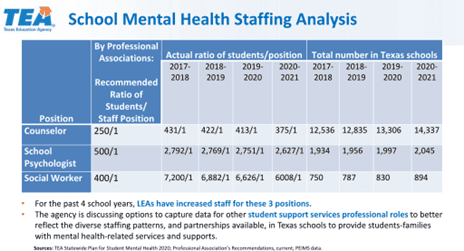
2. When it comes to Texas teachers, retention emerged as the primary challenge.
Despite Texas’ supply of teachers reaching its highest point since 2008-09, teachers are resigning faster than schools can replace them. Novice teachers and those prepared through alternative certification programs are leaving the profession in the largest numbers. Invited testimony highlighted a number of promising models to better prepare teachers to stay and succeed, including year-long, affordable teacher residencies and Grow Your Own pathways for high school students and paraprofessionals.
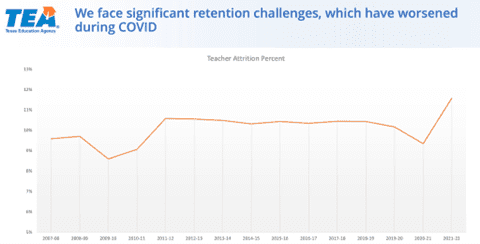
3. More than pay, working conditions are negatively affecting teachers. The lack of job-embedded time to plan, collaborate and develop, in particular, received a lot of attention.
Texas Education Agency (TEA) Commissioner Mike Morath used sample schedules like the one below to illustrate the sheer number of instructional hours required of teachers, while pointing to the lack of high-quality instructional materials and classroom management supports as other key sources of teacher stress.

4. Time and people are the primary resources schools need to help students recover academically from learning disruptions caused by the pandemic.
According to TEA estimates, school systems have roughly $4 billion in federal relief funds to deliver high-impact tutoring as required by House Bill 4545. While those federal dollars will expire after the next two years, schools are working hard to adjust their schedules and calendars to provide supplemental time for instruction. And despite the availability of more than 250,000 tutors vetted by TEA (the majority through virtual providers), school leaders are still ramping up staffing models and partnerships to ensure small group ratios supported by research, rather than rely exclusively on their existing teachers.
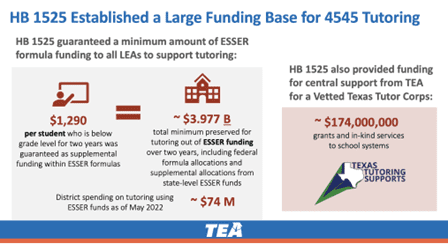
5. Strategies funded by House Bill 3, including Additional Days School Year and Teacher Incentive Allotment, continue to be adopted statewide.
Comprehensive school finance legislation passed in 2019 included new funding streams designed to improve student outcomes. To combat interrupted learning experienced by students without access to summer opportunities, optional Additional Days School Year funding has enabled 59 school systems to provide an average of 20 additional days to students on a total of 326 elementary campuses. In an effort to retain and more equitably distribute their best teachers, 240 districts have opted into the Teacher Incentive Allotment, resulting in a projected $187 million in additional compensation for nearly 16,000 classroom educators. Finally, the state funded more than $216 million in College Career Military Readiness (CCMR) Outcomes Bonuses and more than $17.5 million in SAT/ACT assessment reimbursements in 2020-21. As school systems deploy these funds, data continues to show persistent racial disparities in access to advanced coursework and college prep opportunities.
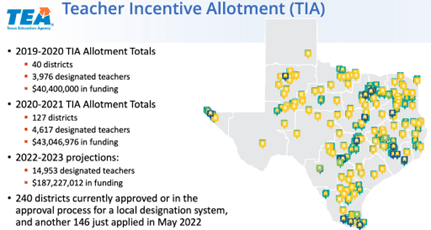
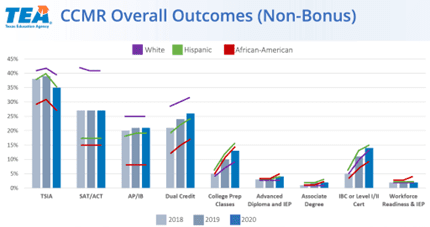
As more interim hearings are held later in 2022, Ed Trust in Texas will continue to monitor and share the latest developments.
